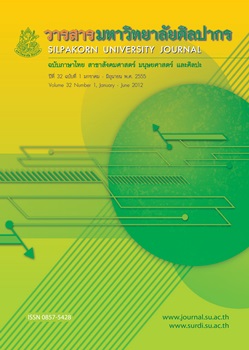คำสรรพนาม man ในภาษาเยอรมันกับคำเทียบเคียงในภาษาไทย The German Pronoun man and Its Equivalents in Thai
Main Article Content
Abstract
บทคัดย่อ
งานวิจัยนี้เป็นการศึกษาเปรียบต่า่งคำสรรพนาม man ในภาษาเยอรมันกับคำเทียบเคียงของคำสรรพนามนี้ในภาษาไทย โดยอาศัยข้อมูลจากคลังข้อมูลสองภาษาสองทิศทางซึ่งประกอบด้วยเรื่องสั้นร่วมสมัยภาษาเยอรมันและภาษาไทยพร้อมบทแปลเป็นอีกภาษาหนึ่ง ผลการวิจัยพบว่าภาษาไทยมีรูปของคำเทียบเคียงคำสรรพนาม man ในภาษาเยอรมนั 14 รปู ทั้งนี้ ประโยคภาษาไทยที่เทียบเคียงไดกั้บประโยคที่ใช้ man ในภาษาเยอรมันส่วนใหญ่เ่ป็นประโยคที่ไมมี่ประธาน การใช้ประธานไร้รูปจึงถือเป็นคำเทียบเคียงที่ใช้บ่อยที่สุดสำหรับโครงสร้างภาษาเยอรมันที่ใช้คำสรรพนาม man ส่วนคำเทียบเคียงรูปอื่นๆ สามารถแบ่งประเภทออกได้เ้ป็น3 กลุม่ ไดแ้ก่ กลุ่มที่มีความหมายเป็นบุรุษสรรพนามบุรุษที่ 1 กลุ่มที่มีความหมายเป็นบุรุษสรรพนามบุรุษที่ 3 และกลุ่มที่เป็นอนิยมสรรพนาม (“ใคร”) ในขณะที่ภาษาเยอรมันแสดงรูปของประธานที่เป็นมนุษย์ด้วยการใช้คำสรรพนามที่ไม่เฉพาะเจาะจงอย่าง man ภาษาไทยเลือกใช้กลวิธีที่ในประโยคไม่ปรากฏรูปประธาน ซึ่งเป็นการทำให้บุคคลที่ไม่ชี้เฉพาะเจาะจงนี้ ไม่ต้องมีรูปปรากฏ
คำสำคัญ: 1. คำสรรพนาม man. 2. คำเทียบเคียง. 3. ภาษาเยอรมัน. 4. ภาษาไทย.
Abstract
This paper presents a contrastive analysis of the German generic pronoun man (Engl. one) and its equivalents in Thai. For the analysis, a bidirectional parallel corpus consisting of contemporary German and Thai short stories and their translation into the other language was used. In the corpus, there are 14 forms of Thai equivalents to man. Generally, the equivalent sentences do not have any subject at all. The subjectless construction is therefore the most frequent equivalent structure of man-sentences in German. The other forms emerging as counterparts to the German man can be categorized into 3 groups with the meaning scope of 1st person, 3rd person, and different variants of the indefinite pronoun khraj (‘who’). Whereas the German language marks the unspecification of the human subject with the grammaticalized generic pronoun man, Thai chooses to make human referents which should not be further specified “invisible”.
Keywords: 1. Pronoun man. 2. Equivalent. 3. German Language. 4. Thai Language.


